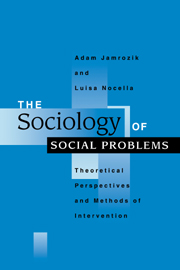Book contents
- Frontmatter
- Contents
- List of Tables
- List of Figures
- Preface and Acknowledgements
- 1 Introduction: Theoretical Perspectives on Social Problems
- 2 Contemporary Perspectives on Social Problems
- 3 Methods of Intervention in Social Problems
- 4 Social Actors in Social Problems
- 5 Challenges of Contemporary Social Problems
- 6 Social Problems in the Residualist Conversion Perspective
- 7 Inequality – The Underlying Universal Issue in Social Problems
- 8 The Social Construction of Family Problems
- 9 The Problem of Social Order
- 10 The Theory of Residualist Conversion: Does it Meet the Test?
- 11 Conclusions and Implications
- Bibliography
- Index
9 - The Problem of Social Order
Published online by Cambridge University Press: 29 March 2011
- Frontmatter
- Contents
- List of Tables
- List of Figures
- Preface and Acknowledgements
- 1 Introduction: Theoretical Perspectives on Social Problems
- 2 Contemporary Perspectives on Social Problems
- 3 Methods of Intervention in Social Problems
- 4 Social Actors in Social Problems
- 5 Challenges of Contemporary Social Problems
- 6 Social Problems in the Residualist Conversion Perspective
- 7 Inequality – The Underlying Universal Issue in Social Problems
- 8 The Social Construction of Family Problems
- 9 The Problem of Social Order
- 10 The Theory of Residualist Conversion: Does it Meet the Test?
- 11 Conclusions and Implications
- Bibliography
- Index
Summary
All social problems contain a threat, either potential or direct, to the dominant social order in society. The issue of social order is of fundamental concern to society, as the maintenance of social order is essential to society's functioning as a social, political and economic unit. Yet the pursuit of social order is also a source of social problems that arise out of law making and law enforcement processes. These processes are carried out by legislative bodies, the justice system, the police, the correctional system, and a plethora of agencies and occupations such as social work, psychology, psychiatry, religious bodies, and a variety of ‘voluntary’ organisations. In a broader perspective, however, the maintenance of social order is to a varying degree an inherent part of all social institutions.
Social order is an ever-present, evergreen social issue – an integral and essential part of social living. Correspondingly, one of the most threatening social conditions – perceived as the most serious social problem – is a condition that carries or is seen to carry the threat of the ‘breakdown of social order’. At its most serious, the breakdown of social order represents a threat to security, to property (public, private, or both), and even to life itself. Extreme forms of this would be situations like those experienced in Rwanda, Somalia, Liberia and Nigeria.
- Type
- Chapter
- Information
- The Sociology of Social ProblemsTheoretical Perspectives and Methods of Intervention, pp. 180 - 198Publisher: Cambridge University PressPrint publication year: 1998



